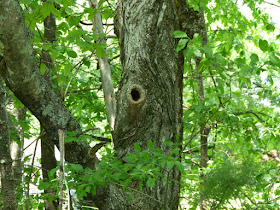The occasion is reporting that says - Oh I Am So Shocked - the Environmental Protection Agency is upset with Monsanto because its genetically engineered corn is turning out to have serious problems, and those problems are appearing sooner than expected.
 |
| Today's Lovely Forest Refuge Pictures Are By Jan |
A case in point is AP reporter Rick Callahan, seen in the HuffPo (which is increasingly a mainstream member of the LM). He gets the explaining part done well, after all he does write for the AP. Then he goes on to quote a slick fleet of professors, also normal practice in these articles. He includes the obligatory quote from the EPA, clucking its government tongue at what the same government has been protecting and promoting all these years.
Then we come to the "citizen" input. What do we get? A single unintelligible sentence from a professional climate change denier. What about the scores of people who have been warning of Monsanto's insect resistance problem year after year? Nada.
Margaret Mellon, Senior Scientist at the Union of Concerned Scientists-USA, wrote a book in 1996 along with Jane Rissler, The Ecological Risks of Engineered Crops. It remains the best book on the subject and lib arts people can understand it. Dr. Mellon has continued to write and speak on engineered food since then, and you can find lots more from people like the author of Farmageddon, Canadian Brewster Kneen - and do have a look at his family's magazine, The Ram's Horn (www.ramshorn.ca). You could even read Genetically Engineered Food: Changing the Nature of Nature, the second edition came out in 2001. I wrote it.
There are many other sources of useful information on the dangers of engineered crops. Ten years ago, the LM called me daily when they needed an instant tart quip for a conflict story; now they seem to have lost track of the stacks of critical evidence going back 15 years. And perhaps they are unaware of Google.
At least Callahan put obvious effort into the story - the vast majority of the LM is mute on this rather significant development in our food supply.
My second complaint is hinted at above: when Monsanto engineered its crops the risk were well known, including the possible need to increase application of poisons on crops, the spread of engineered traits to non-engineered crops, and the development of "superbugs" that couldn't be killed easily - or at all. This can jeopardize the food, our organic industry, our health, and security of the environment. Risks were known before Monsanto's engineered corn was released, as Callahan says, by many including the government that approved it.
Now the EPA is wringing its hands. The government's coddling of a powerful company in spite of future public and environmental health problems is hinted at by Callahan and others, but not explained or documented. Our federal government, which is designed to protect us, gets a free pass by the LM even when those agencies knowingly fail to do their core job.
OK third: Monsanto's response to all this? They're busy pointing the finger at farmers, their customers. This is such a top-drawer instance of blaming the victim, Monsanto should try running the State of Maine, because they've exceeded even our mean-spirited governor's habit of blasting those who are least able to defend themselves. Just when I thought there was nothing Monsanto could do to increase my contempt for their corporate values, they display their creativity in finding a way to let a company agenda roar past public perceptions of fairness and decency.
Many years ago, I was asked to review a tell-all book by the former CIA Station Chief in Saigon. The book showed that the peace movement's worries about what the CIA was up to in Viet Nam were mostly true and in many instances, more egregious than had been suspected. The review concluded that activists were not too "paranoid." In fact, if we had any fault in those years, we weren't critical enough. The same holds true for the continuing battle over accelerating domination of the world's agriculture by genetic engineers who patent and modify humanity's food at our expense and risk. The problem isn't that we're too suspicious or alarmist - it's that we're not skeptical and critical enough.
When some biotech company wrecks part of our food supply, and you can no longer safely consume that food, and engineered genes have contaminated even the non-owned part of that crop - then what will you eat?

